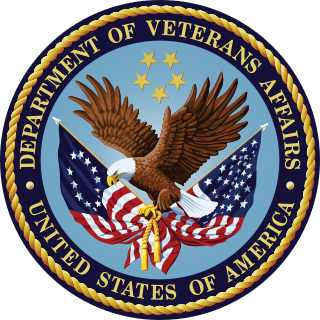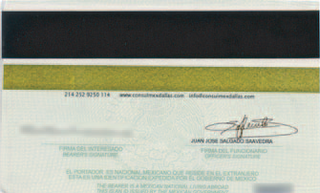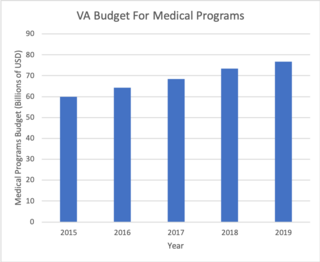
The United States Department of Veterans Affairs (VA) is a Cabinet-level executive branch department of the federal government charged with providing lifelong healthcare services to eligible military veterans at the 170 VA medical centers and outpatient clinics located throughout the country. Non-healthcare benefits include disability compensation, vocational rehabilitation, education assistance, home loans, and life insurance. The VA also provides burial and memorial benefits to eligible veterans and family members at 135 national cemeteries.
An identity document is any document that may be used to prove a person's identity. If issued in a small, standard credit card size form, it is usually called an identity card, or passport card. Some countries issue formal identity documents, as national identification cards that may be compulsory or non-compulsory, while others may require identity verification using regional identification or informal documents. When the identity document incorporates a person's photograph, it may be called photo ID.

A military discharge is given when a member of the armed forces is released from their obligation to serve. Each country's military has different types of discharge. They are generally based on whether the persons completed their training and then fully and satisfactorily completed their term of service. Other types of discharge are based on factors such as the quality of their service, whether their service had to be ended prematurely due to humanitarian or medical reasons, whether they had been found to have drug or alcohol dependency issues and whether they were complying with treatment and counseling, and whether they had demerits or punishments for infractions or were convicted of any crimes. These factors affect whether they will be asked or allowed to re-enlist and whether they qualify for benefits after their discharge.

The Matrícula Consular de Alta Seguridad, also known as the Mexican Consular Identification Card, is an identification card issued by the Government of Mexico through its consulate offices to Mexican nationals residing outside of Mexico. Also known as the Mexican CID card, it has been issued since 1871. The issue of the card has no bearing on immigration status in the foreign country they are residing in. The purpose of the card is to demonstrate that the bearer is a Mexican national living outside of Mexico. It includes a Government of Mexico issued ID number and bears a photograph and address outside of Mexico of the Mexican national to whom it is issued.

The Veterans Health Administration (VHA) is the component of the United States Department of Veterans Affairs (VA) led by the Under Secretary of Veterans Affairs for Health that implements the healthcare program of the VA through a nationalized healthcare service in the United States, providing healthcare and healthcare-adjacent services to veterans through the administration and operation of 146 VA Medical Centers (VAMC) with integrated outpatient clinics, 772 Community Based Outpatient Clinics (CBOC), and 134 VA Community Living Centers Programs. It is the largest division in the department, and second largest in the entire federal government, employing over 350,000 employees. All VA hospitals, clinics and medical centers are owned by and operated by the Department of Veterans Affairs, and all of the staff employed in VA hospitals are federal employees. Because of this, veterans that qualify for VHA healthcare do not pay premiums or deductibles for their healthcare but may have to make copayments depending on the medical procedure. VHA is not a part of the US Department of Defense Military Health System.
In the United States, identity documents are typically the regional state-issued driver's license or identity card, while also the Social Security card and the United States Passport Card may serve as national identification. The United States passport itself also may serve as identification. There is, however, no official "national identity card" in the United States, in the sense that there is no federal agency with nationwide jurisdiction that directly issues an identity document to all US citizens for mandatory regular use.

PASS is a government-backed scheme in the UK that gives citizens a valid and accepted form of proof of age identification. The scheme is supported by the Home Office, the Chartered Trading Standards Institute (CTSI) and the National Police Chiefs' Council (NPCC). It acts as an umbrella system: it does not itself issue identification cards, but various proof of age card schemes operate under the PASS umbrella, and issue cards which bear a PASS hologram as proof of authenticity and validity.
The DD Form 214, Certificate of Release or Discharge from Active Duty, generally referred to as a "DD 214", is a document of the United States Department of Defense, issued upon a military service member's retirement, separation, or discharge from active duty in the Armed Forces of the United States.

A United States Uniformed Services Privilege and Identification Card is an identity document issued by the United States Department of Defense to identify a person as a member of the Armed Forces or a member's dependent, such as a child or spouse.

The Under Secretary of Veterans Affairs for Health is a sub-cabinet position in the United States Department of Veterans Affairs. Formerly known as the Chief Medical Director of Veterans Health, the Undersecretary is the highest official directly responsible to the Secretary for the Veterans Health Administration, which is the largest agency within the department. Although the position is no longer required to be held by a licensed physician, senior medical professionals such as hospital administrators are typically the preferred selectee for nomination, based on both demonstrated ability in the medical profession or health care administration, and with substantial experience in Veterans healthcare or similar programs.

The Under Secretary for Benefits (USB), in the United States Department of Veterans Affairs, directs the Veterans Benefits Administration through regional offices in 50 states, the District of Columbia, Puerto Rico, and the Philippines. The Under Secretary is responsible for the administration of benefits provided by the Department to veterans and dependents, including compensation, pension, education, home loan guaranty, vocational rehabilitation, and life insurance.
Defense Enrollment Eligibility Reporting System (DEERS) is a computerized database for United States Service members, military retirees, 100% VA Disabled Veterans, dependents, DoD active Contractors, and others worldwide who are entitled to Public Key Infrastructure and TRICARE eligibility.
Matthew Samuel Collier is a veteran, business executive, entrepreneur, and speaker. At 29, he was elected as the youngest big-city "strong" mayor in the United States when he served as the chief executive of his hometown of Flint, Michigan, from 1987 to 1991. Following his four-year stint as mayor, he served in executive roles with several technology companies.

A voter identification law is a law that requires a person to show some form of identification in order to vote. In some jurisdictions requiring photo IDs, voters who do not have photo ID often must have their identity verified by someone else or sign a Challenged Voter Affidavit in order to receive a ballot to vote.

The Luxembourg identity card is issued to Luxembourg citizens. It serves as proof of identity and nationality and can also be used for travel within the European Union and a number of other European countries.

The Veteran Health Identification Card (VHIC) is an identification card issued by the United States Department of Veterans Affairs (VA) for eligible veterans to receive medical care at VA Medical Facilities. The VHIC protects the privacy of veterans' sensitive information, as it no longer displays the Social Security number or date of birth on the front of the card. The VHIC will only display the veteran's name, picture, and special eligibility indicators—Service Connected, Purple Heart and former POW, if applicable, on the front of the card. Only veterans who are eligible for VA medical benefits will receive the card. Starting on Jan. 1, 2020, the Purple Heart and Disabled Veterans Equal Access Act allows Purple Heart recipients, former prisoners of war and veterans with service-connected disabilities entry onto military installations to use the AAFES Exchange; commissary and Morale, Welfare and Recreation facilities.

United States military veteran suicide is an ongoing phenomenon regarding the high rate of suicide among U.S. military veterans in comparison to the general civilian public. A focus on preventing veteran suicide began in 1958 with the opening of the first suicide prevention center in the United States. During the mid-1990s, a paradigm shift in addressing veteran suicide occurred with the development of a national strategy which included several Congressional Resolutions. More advancements were made in 2007, when the Joshua Omvig Veterans Suicide Prevention Act created a comprehensive program including outreach at each Veterans Affairs Office (VA) and the implementation of a 24-hour crisis hotline. PTSD, depression, and combat-related guilt in veterans are often related to suicide as it can be difficult for veterans to transition to civilian life.

Brenda S. "Sue" Fulton is a former American government official and former military officer who has served as the assistant secretary of veterans affairs for public and intergovernmental affairs in the United States Department of Veterans Affairs. She commissioned in the United States Army as a signal officer, serving as both a platoon leader and company commander in Germany before receiving an honorable discharge at the rank of captain.
Cohen Veterans Network (CVN) is a US not-for-profit philanthropic organization that serves post-9/11 veterans and their families through a nationwide system of mental health clinics. CVN's headquarters are in Stamford, Connecticut, United States.
Supportive Services for Veteran Families (SSVF) was established by the United States Department of Veterans Affairs (VA) in 2011 to create public-private partnerships to rapidly re-house homeless Veteran families and prevent homelessness for very low-income Veterans at imminent risk due to a housing crisis. SSVF has been led since its inception by John Kuhn, the previous VA National Director of Homeless Evaluation.












